IT Ethics: Cambridge Analytica Case Study Analysis Report - Ethics
VerifiedAdded on 2022/11/30
|6
|1785
|320
Report
AI Summary
This report provides a comprehensive analysis of the Cambridge Analytica case study, focusing on the ethical implications of data collection and privacy breaches within the context of social media. The report examines the case through the lens of four classical ethical theories: utilitarianism, deontology, virtue ethics, and contract theory. It discusses how Facebook's actions, particularly the leakage of user data to Cambridge Analytica, fail to meet the criteria of these ethical frameworks. The analysis considers the impact on user happiness, the violation of duties and contracts, and the lack of virtuous leadership. The report concludes by highlighting the unethical nature of the actions and suggests recommendations for government and users to mitigate such risks, emphasizing the need for stricter regulations and increased user awareness.

IT Ethics
Paraphrase This Document
Need a fresh take? Get an instant paraphrase of this document with our AI Paraphraser
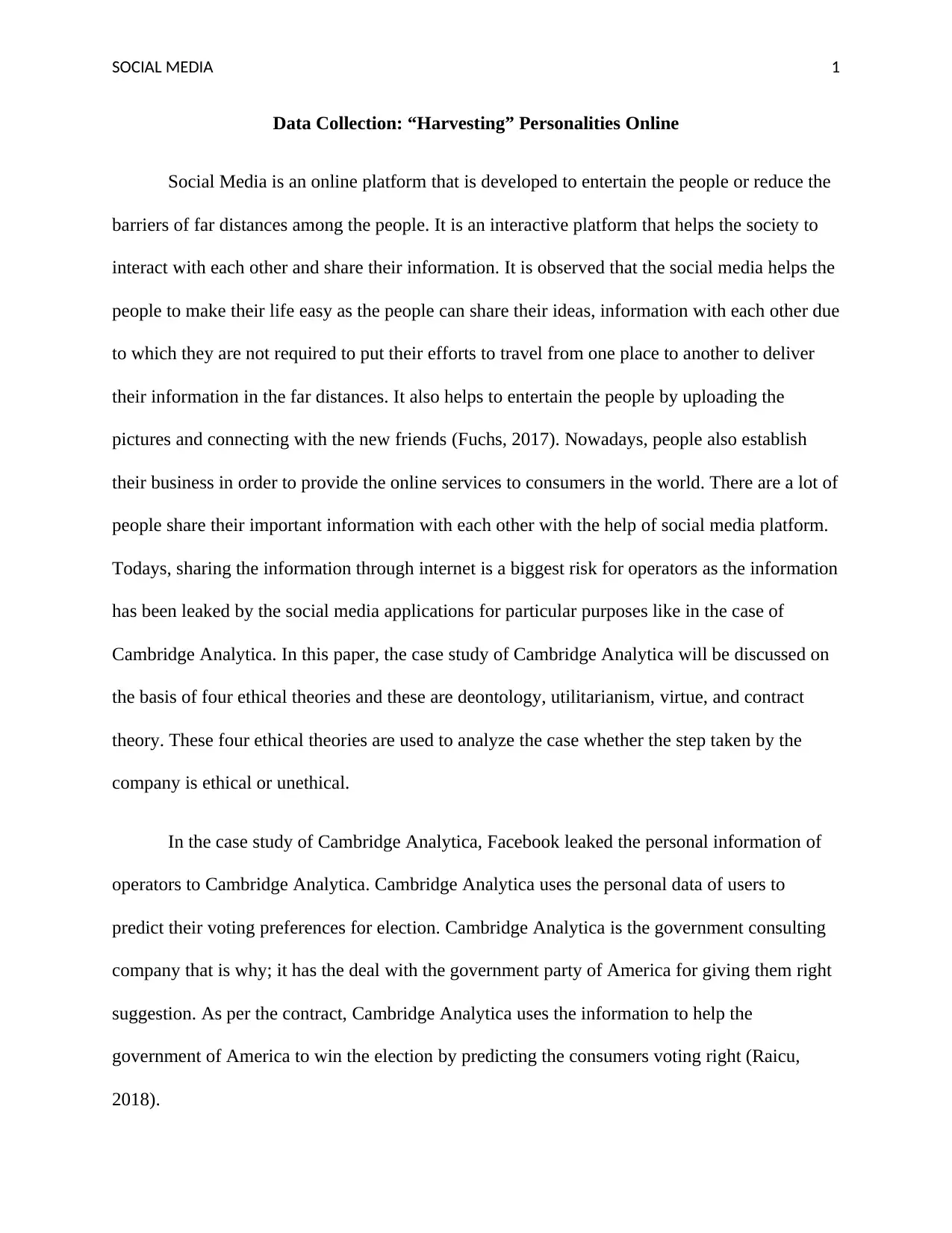
SOCIAL MEDIA 1
Data Collection: “Harvesting” Personalities Online
Social Media is an online platform that is developed to entertain the people or reduce the
barriers of far distances among the people. It is an interactive platform that helps the society to
interact with each other and share their information. It is observed that the social media helps the
people to make their life easy as the people can share their ideas, information with each other due
to which they are not required to put their efforts to travel from one place to another to deliver
their information in the far distances. It also helps to entertain the people by uploading the
pictures and connecting with the new friends (Fuchs, 2017). Nowadays, people also establish
their business in order to provide the online services to consumers in the world. There are a lot of
people share their important information with each other with the help of social media platform.
Todays, sharing the information through internet is a biggest risk for operators as the information
has been leaked by the social media applications for particular purposes like in the case of
Cambridge Analytica. In this paper, the case study of Cambridge Analytica will be discussed on
the basis of four ethical theories and these are deontology, utilitarianism, virtue, and contract
theory. These four ethical theories are used to analyze the case whether the step taken by the
company is ethical or unethical.
In the case study of Cambridge Analytica, Facebook leaked the personal information of
operators to Cambridge Analytica. Cambridge Analytica uses the personal data of users to
predict their voting preferences for election. Cambridge Analytica is the government consulting
company that is why; it has the deal with the government party of America for giving them right
suggestion. As per the contract, Cambridge Analytica uses the information to help the
government of America to win the election by predicting the consumers voting right (Raicu,
2018).
Data Collection: “Harvesting” Personalities Online
Social Media is an online platform that is developed to entertain the people or reduce the
barriers of far distances among the people. It is an interactive platform that helps the society to
interact with each other and share their information. It is observed that the social media helps the
people to make their life easy as the people can share their ideas, information with each other due
to which they are not required to put their efforts to travel from one place to another to deliver
their information in the far distances. It also helps to entertain the people by uploading the
pictures and connecting with the new friends (Fuchs, 2017). Nowadays, people also establish
their business in order to provide the online services to consumers in the world. There are a lot of
people share their important information with each other with the help of social media platform.
Todays, sharing the information through internet is a biggest risk for operators as the information
has been leaked by the social media applications for particular purposes like in the case of
Cambridge Analytica. In this paper, the case study of Cambridge Analytica will be discussed on
the basis of four ethical theories and these are deontology, utilitarianism, virtue, and contract
theory. These four ethical theories are used to analyze the case whether the step taken by the
company is ethical or unethical.
In the case study of Cambridge Analytica, Facebook leaked the personal information of
operators to Cambridge Analytica. Cambridge Analytica uses the personal data of users to
predict their voting preferences for election. Cambridge Analytica is the government consulting
company that is why; it has the deal with the government party of America for giving them right
suggestion. As per the contract, Cambridge Analytica uses the information to help the
government of America to win the election by predicting the consumers voting right (Raicu,
2018).
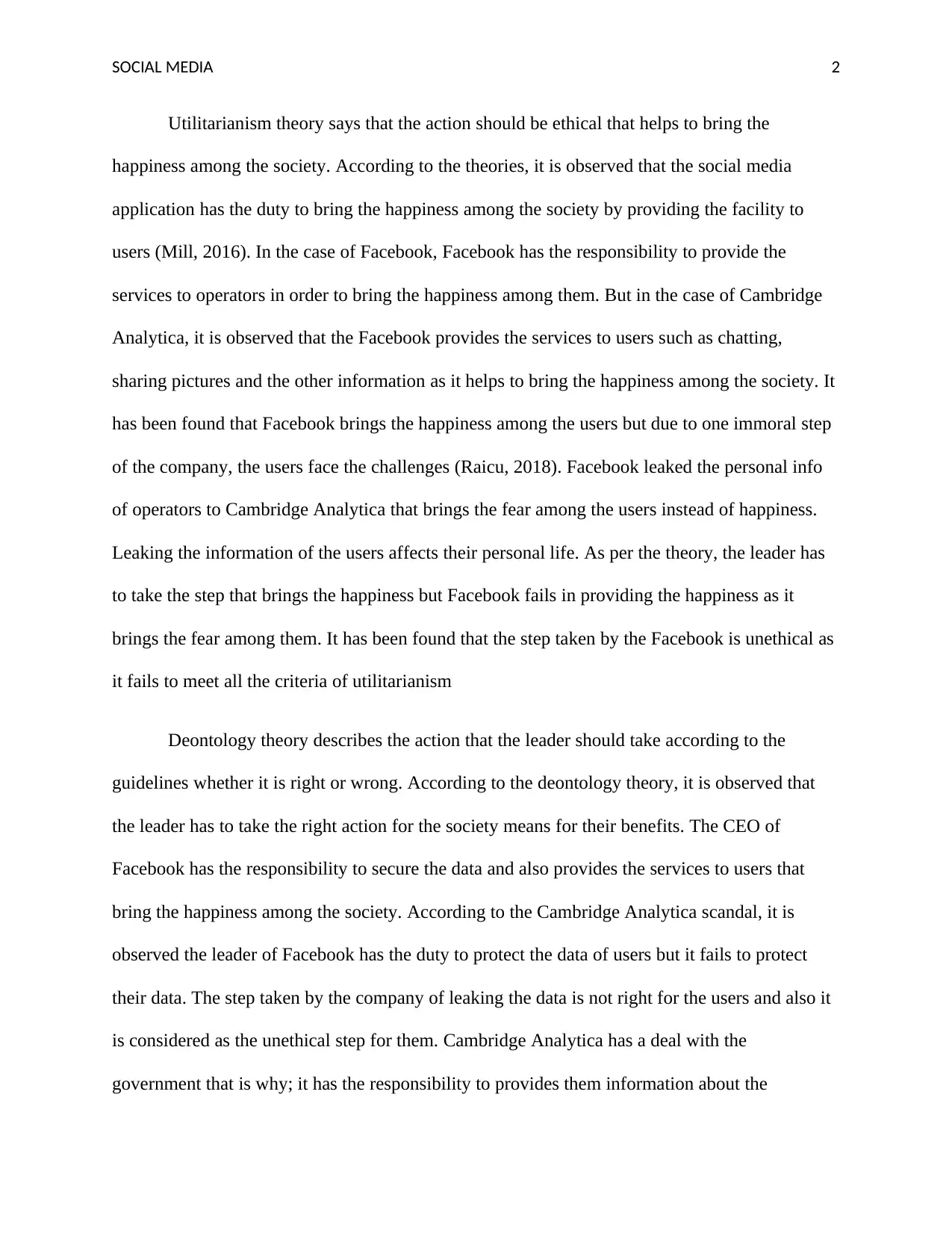
SOCIAL MEDIA 2
Utilitarianism theory says that the action should be ethical that helps to bring the
happiness among the society. According to the theories, it is observed that the social media
application has the duty to bring the happiness among the society by providing the facility to
users (Mill, 2016). In the case of Facebook, Facebook has the responsibility to provide the
services to operators in order to bring the happiness among them. But in the case of Cambridge
Analytica, it is observed that the Facebook provides the services to users such as chatting,
sharing pictures and the other information as it helps to bring the happiness among the society. It
has been found that Facebook brings the happiness among the users but due to one immoral step
of the company, the users face the challenges (Raicu, 2018). Facebook leaked the personal info
of operators to Cambridge Analytica that brings the fear among the users instead of happiness.
Leaking the information of the users affects their personal life. As per the theory, the leader has
to take the step that brings the happiness but Facebook fails in providing the happiness as it
brings the fear among them. It has been found that the step taken by the Facebook is unethical as
it fails to meet all the criteria of utilitarianism
Deontology theory describes the action that the leader should take according to the
guidelines whether it is right or wrong. According to the deontology theory, it is observed that
the leader has to take the right action for the society means for their benefits. The CEO of
Facebook has the responsibility to secure the data and also provides the services to users that
bring the happiness among the society. According to the Cambridge Analytica scandal, it is
observed the leader of Facebook has the duty to protect the data of users but it fails to protect
their data. The step taken by the company of leaking the data is not right for the users and also it
is considered as the unethical step for them. Cambridge Analytica has a deal with the
government that is why; it has the responsibility to provides them information about the
Utilitarianism theory says that the action should be ethical that helps to bring the
happiness among the society. According to the theories, it is observed that the social media
application has the duty to bring the happiness among the society by providing the facility to
users (Mill, 2016). In the case of Facebook, Facebook has the responsibility to provide the
services to operators in order to bring the happiness among them. But in the case of Cambridge
Analytica, it is observed that the Facebook provides the services to users such as chatting,
sharing pictures and the other information as it helps to bring the happiness among the society. It
has been found that Facebook brings the happiness among the users but due to one immoral step
of the company, the users face the challenges (Raicu, 2018). Facebook leaked the personal info
of operators to Cambridge Analytica that brings the fear among the users instead of happiness.
Leaking the information of the users affects their personal life. As per the theory, the leader has
to take the step that brings the happiness but Facebook fails in providing the happiness as it
brings the fear among them. It has been found that the step taken by the Facebook is unethical as
it fails to meet all the criteria of utilitarianism
Deontology theory describes the action that the leader should take according to the
guidelines whether it is right or wrong. According to the deontology theory, it is observed that
the leader has to take the right action for the society means for their benefits. The CEO of
Facebook has the responsibility to secure the data and also provides the services to users that
bring the happiness among the society. According to the Cambridge Analytica scandal, it is
observed the leader of Facebook has the duty to protect the data of users but it fails to protect
their data. The step taken by the company of leaking the data is not right for the users and also it
is considered as the unethical step for them. Cambridge Analytica has a deal with the
government that is why; it has the responsibility to provides them information about the
⊘ This is a preview!⊘
Do you want full access?
Subscribe today to unlock all pages.

Trusted by 1+ million students worldwide
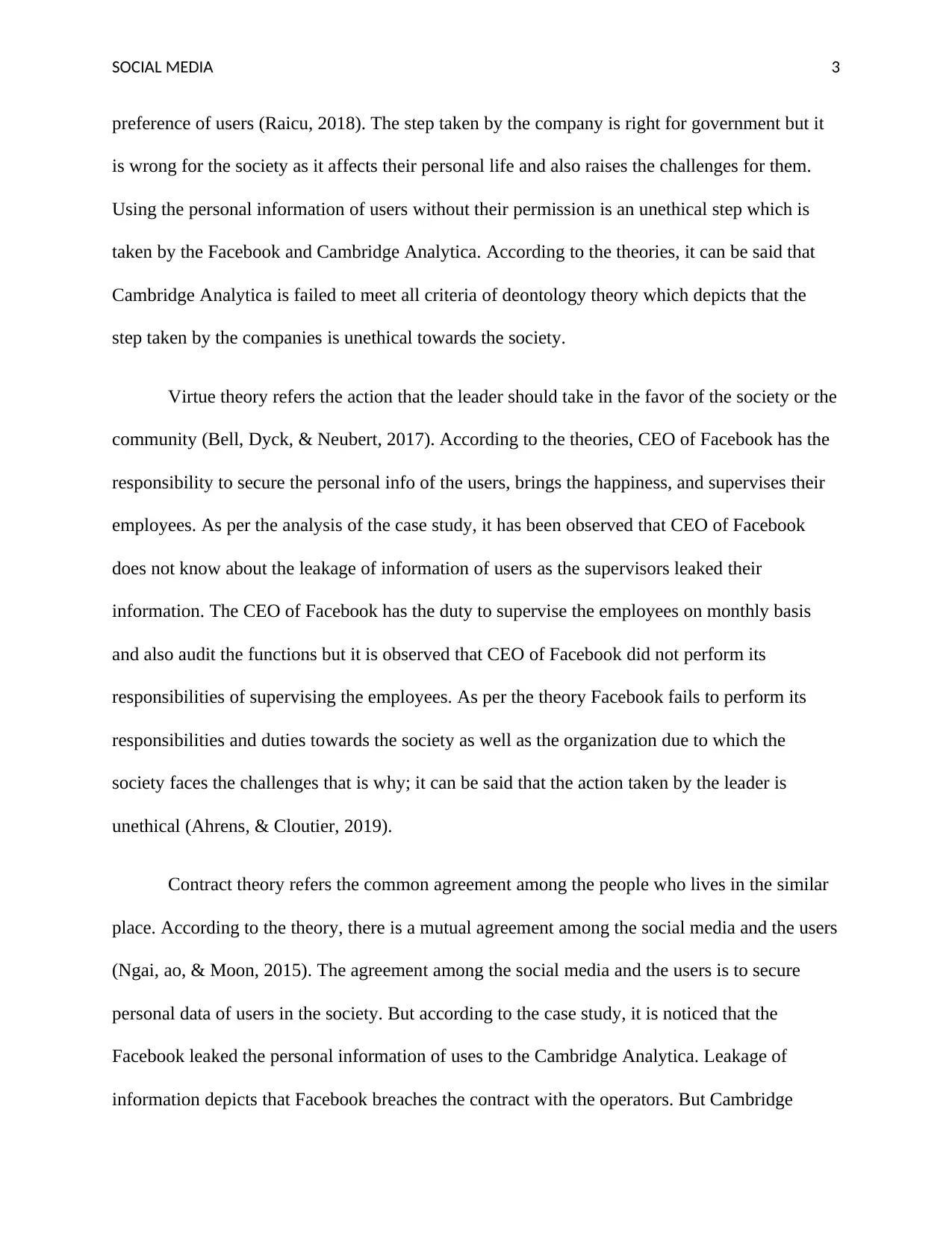
SOCIAL MEDIA 3
preference of users (Raicu, 2018). The step taken by the company is right for government but it
is wrong for the society as it affects their personal life and also raises the challenges for them.
Using the personal information of users without their permission is an unethical step which is
taken by the Facebook and Cambridge Analytica. According to the theories, it can be said that
Cambridge Analytica is failed to meet all criteria of deontology theory which depicts that the
step taken by the companies is unethical towards the society.
Virtue theory refers the action that the leader should take in the favor of the society or the
community (Bell, Dyck, & Neubert, 2017). According to the theories, CEO of Facebook has the
responsibility to secure the personal info of the users, brings the happiness, and supervises their
employees. As per the analysis of the case study, it has been observed that CEO of Facebook
does not know about the leakage of information of users as the supervisors leaked their
information. The CEO of Facebook has the duty to supervise the employees on monthly basis
and also audit the functions but it is observed that CEO of Facebook did not perform its
responsibilities of supervising the employees. As per the theory Facebook fails to perform its
responsibilities and duties towards the society as well as the organization due to which the
society faces the challenges that is why; it can be said that the action taken by the leader is
unethical (Ahrens, & Cloutier, 2019).
Contract theory refers the common agreement among the people who lives in the similar
place. According to the theory, there is a mutual agreement among the social media and the users
(Ngai, ao, & Moon, 2015). The agreement among the social media and the users is to secure
personal data of users in the society. But according to the case study, it is noticed that the
Facebook leaked the personal information of uses to the Cambridge Analytica. Leakage of
information depicts that Facebook breaches the contract with the operators. But Cambridge
preference of users (Raicu, 2018). The step taken by the company is right for government but it
is wrong for the society as it affects their personal life and also raises the challenges for them.
Using the personal information of users without their permission is an unethical step which is
taken by the Facebook and Cambridge Analytica. According to the theories, it can be said that
Cambridge Analytica is failed to meet all criteria of deontology theory which depicts that the
step taken by the companies is unethical towards the society.
Virtue theory refers the action that the leader should take in the favor of the society or the
community (Bell, Dyck, & Neubert, 2017). According to the theories, CEO of Facebook has the
responsibility to secure the personal info of the users, brings the happiness, and supervises their
employees. As per the analysis of the case study, it has been observed that CEO of Facebook
does not know about the leakage of information of users as the supervisors leaked their
information. The CEO of Facebook has the duty to supervise the employees on monthly basis
and also audit the functions but it is observed that CEO of Facebook did not perform its
responsibilities of supervising the employees. As per the theory Facebook fails to perform its
responsibilities and duties towards the society as well as the organization due to which the
society faces the challenges that is why; it can be said that the action taken by the leader is
unethical (Ahrens, & Cloutier, 2019).
Contract theory refers the common agreement among the people who lives in the similar
place. According to the theory, there is a mutual agreement among the social media and the users
(Ngai, ao, & Moon, 2015). The agreement among the social media and the users is to secure
personal data of users in the society. But according to the case study, it is noticed that the
Facebook leaked the personal information of uses to the Cambridge Analytica. Leakage of
information depicts that Facebook breaches the contract with the operators. But Cambridge
Paraphrase This Document
Need a fresh take? Get an instant paraphrase of this document with our AI Paraphraser
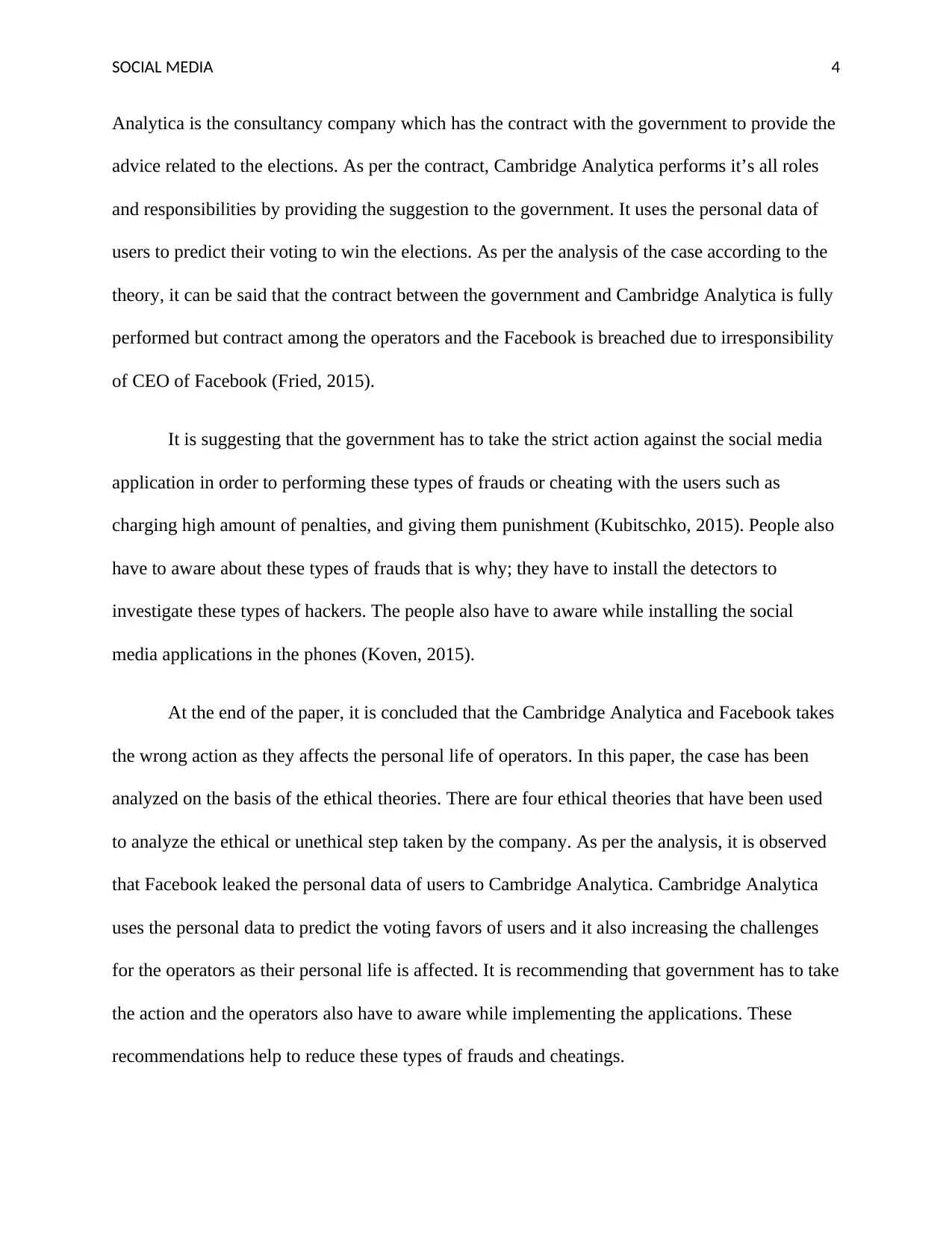
SOCIAL MEDIA 4
Analytica is the consultancy company which has the contract with the government to provide the
advice related to the elections. As per the contract, Cambridge Analytica performs it’s all roles
and responsibilities by providing the suggestion to the government. It uses the personal data of
users to predict their voting to win the elections. As per the analysis of the case according to the
theory, it can be said that the contract between the government and Cambridge Analytica is fully
performed but contract among the operators and the Facebook is breached due to irresponsibility
of CEO of Facebook (Fried, 2015).
It is suggesting that the government has to take the strict action against the social media
application in order to performing these types of frauds or cheating with the users such as
charging high amount of penalties, and giving them punishment (Kubitschko, 2015). People also
have to aware about these types of frauds that is why; they have to install the detectors to
investigate these types of hackers. The people also have to aware while installing the social
media applications in the phones (Koven, 2015).
At the end of the paper, it is concluded that the Cambridge Analytica and Facebook takes
the wrong action as they affects the personal life of operators. In this paper, the case has been
analyzed on the basis of the ethical theories. There are four ethical theories that have been used
to analyze the ethical or unethical step taken by the company. As per the analysis, it is observed
that Facebook leaked the personal data of users to Cambridge Analytica. Cambridge Analytica
uses the personal data to predict the voting favors of users and it also increasing the challenges
for the operators as their personal life is affected. It is recommending that government has to take
the action and the operators also have to aware while implementing the applications. These
recommendations help to reduce these types of frauds and cheatings.
Analytica is the consultancy company which has the contract with the government to provide the
advice related to the elections. As per the contract, Cambridge Analytica performs it’s all roles
and responsibilities by providing the suggestion to the government. It uses the personal data of
users to predict their voting to win the elections. As per the analysis of the case according to the
theory, it can be said that the contract between the government and Cambridge Analytica is fully
performed but contract among the operators and the Facebook is breached due to irresponsibility
of CEO of Facebook (Fried, 2015).
It is suggesting that the government has to take the strict action against the social media
application in order to performing these types of frauds or cheating with the users such as
charging high amount of penalties, and giving them punishment (Kubitschko, 2015). People also
have to aware about these types of frauds that is why; they have to install the detectors to
investigate these types of hackers. The people also have to aware while installing the social
media applications in the phones (Koven, 2015).
At the end of the paper, it is concluded that the Cambridge Analytica and Facebook takes
the wrong action as they affects the personal life of operators. In this paper, the case has been
analyzed on the basis of the ethical theories. There are four ethical theories that have been used
to analyze the ethical or unethical step taken by the company. As per the analysis, it is observed
that Facebook leaked the personal data of users to Cambridge Analytica. Cambridge Analytica
uses the personal data to predict the voting favors of users and it also increasing the challenges
for the operators as their personal life is affected. It is recommending that government has to take
the action and the operators also have to aware while implementing the applications. These
recommendations help to reduce these types of frauds and cheatings.
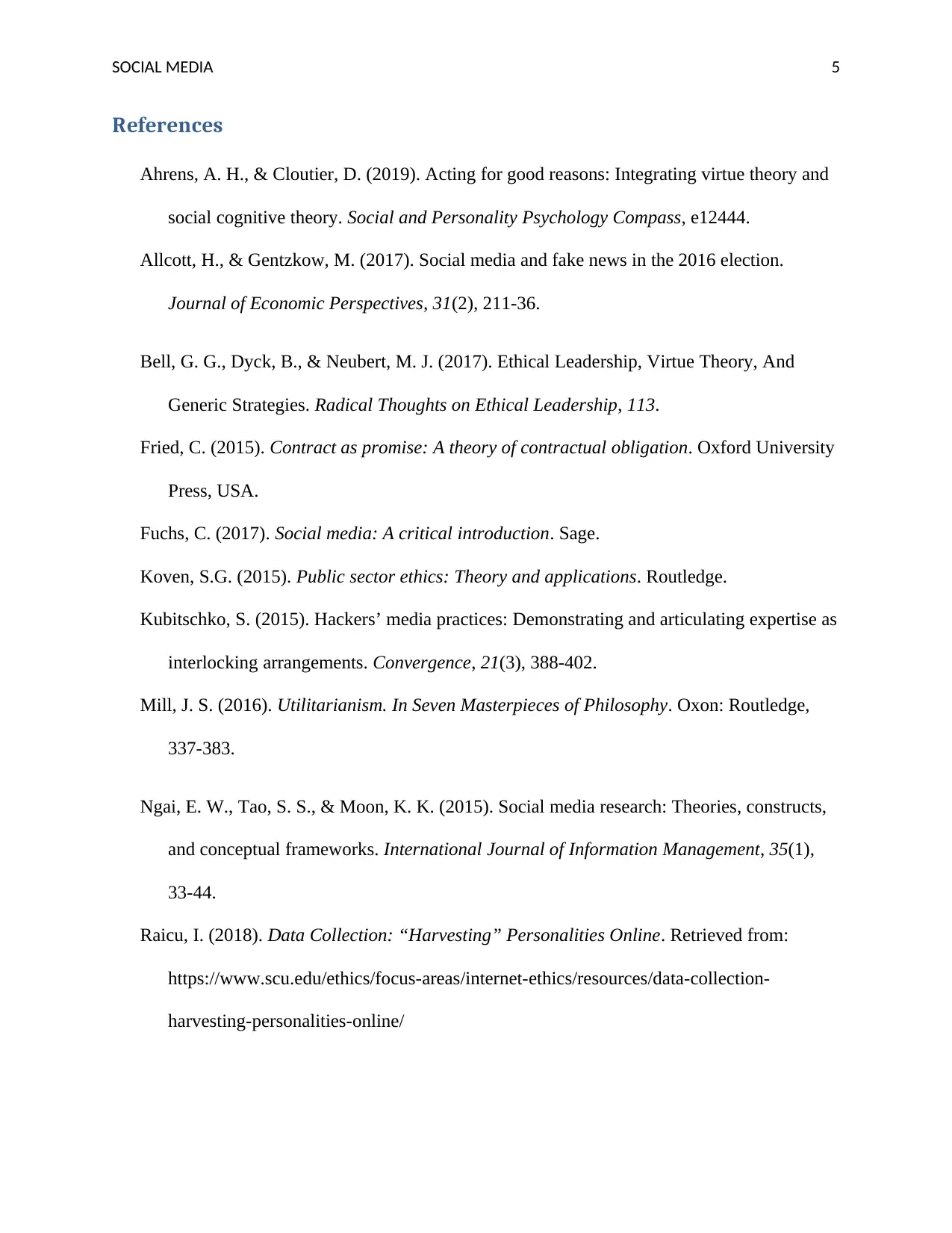
SOCIAL MEDIA 5
References
Ahrens, A. H., & Cloutier, D. (2019). Acting for good reasons: Integrating virtue theory and
social cognitive theory. Social and Personality Psychology Compass, e12444.
Allcott, H., & Gentzkow, M. (2017). Social media and fake news in the 2016 election.
Journal of Economic Perspectives, 31(2), 211-36.
Bell, G. G., Dyck, B., & Neubert, M. J. (2017). Ethical Leadership, Virtue Theory, And
Generic Strategies. Radical Thoughts on Ethical Leadership, 113.
Fried, C. (2015). Contract as promise: A theory of contractual obligation. Oxford University
Press, USA.
Fuchs, C. (2017). Social media: A critical introduction. Sage.
Koven, S.G. (2015). Public sector ethics: Theory and applications. Routledge.
Kubitschko, S. (2015). Hackers’ media practices: Demonstrating and articulating expertise as
interlocking arrangements. Convergence, 21(3), 388-402.
Mill, J. S. (2016). Utilitarianism. In Seven Masterpieces of Philosophy. Oxon: Routledge,
337-383.
Ngai, E. W., Tao, S. S., & Moon, K. K. (2015). Social media research: Theories, constructs,
and conceptual frameworks. International Journal of Information Management, 35(1),
33-44.
Raicu, I. (2018). Data Collection: “Harvesting” Personalities Online. Retrieved from:
https://www.scu.edu/ethics/focus-areas/internet-ethics/resources/data-collection-
harvesting-personalities-online/
References
Ahrens, A. H., & Cloutier, D. (2019). Acting for good reasons: Integrating virtue theory and
social cognitive theory. Social and Personality Psychology Compass, e12444.
Allcott, H., & Gentzkow, M. (2017). Social media and fake news in the 2016 election.
Journal of Economic Perspectives, 31(2), 211-36.
Bell, G. G., Dyck, B., & Neubert, M. J. (2017). Ethical Leadership, Virtue Theory, And
Generic Strategies. Radical Thoughts on Ethical Leadership, 113.
Fried, C. (2015). Contract as promise: A theory of contractual obligation. Oxford University
Press, USA.
Fuchs, C. (2017). Social media: A critical introduction. Sage.
Koven, S.G. (2015). Public sector ethics: Theory and applications. Routledge.
Kubitschko, S. (2015). Hackers’ media practices: Demonstrating and articulating expertise as
interlocking arrangements. Convergence, 21(3), 388-402.
Mill, J. S. (2016). Utilitarianism. In Seven Masterpieces of Philosophy. Oxon: Routledge,
337-383.
Ngai, E. W., Tao, S. S., & Moon, K. K. (2015). Social media research: Theories, constructs,
and conceptual frameworks. International Journal of Information Management, 35(1),
33-44.
Raicu, I. (2018). Data Collection: “Harvesting” Personalities Online. Retrieved from:
https://www.scu.edu/ethics/focus-areas/internet-ethics/resources/data-collection-
harvesting-personalities-online/
⊘ This is a preview!⊘
Do you want full access?
Subscribe today to unlock all pages.

Trusted by 1+ million students worldwide
1 out of 6
Related Documents
Your All-in-One AI-Powered Toolkit for Academic Success.
+13062052269
info@desklib.com
Available 24*7 on WhatsApp / Email
![[object Object]](/_next/static/media/star-bottom.7253800d.svg)
Unlock your academic potential
Copyright © 2020–2026 A2Z Services. All Rights Reserved. Developed and managed by ZUCOL.





